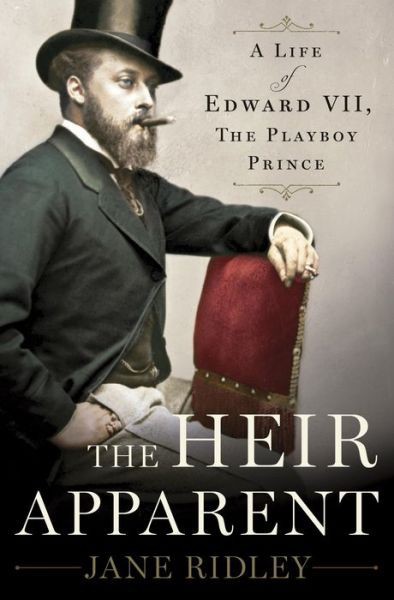
The Heir Apparent
A Life of Edward VII, the Playboy Prince
کتاب های مرتبط
- اطلاعات
- نقد و بررسی
- دیدگاه کاربران
نقد و بررسی

Starred review from September 23, 2013
After researching in the royal archives at Windsor Palace for more than five years, Ridley, a fellow of the Royal Society of Literature and professor of history at Buckingham University, wove together this marvelously rich biography of Edward VII (1841–1910). Called Bertie by his family, Edward’s inner life is teased out by Ridley through the correspondence of those around him. The resulting portrait is remarkably thorough, quite a feat considering the bulk of information that comes from the colossal, dramatic, and one-sided diaries and letters of Bertie’s mother, Queen Victoria (1819–1901). Victoria more often than not disapproved of Bertie and the archives reveal that this neglected child was driven by the need to be worthy of his parents. Continually dismissed, he becomes a closed-off youth, taking great joys where he could find them—far away from Victorian respectability. Ridley shows that for as much as Bertie is portrayed as a slovenly gambler and womanizer, by the time he ascended to the throne in 1901, at age 59, he had matured to play a significant role in reforming Britain’s monarchy. Readers both general and specialized will delight in Ridley’s work; it raises the bar for royal biographies to come.

Starred review from October 15, 2013
A highly readable, definitive biography of Queen Victoria's son, the "black sheep of Buckingham Palace" who matured into an effective monarch. Originally aiming at a short life of Edward VII (1841-1910), the eponymous British king who gave his name to an age, Ridley (History/Buckingham Univ.; Young Disraeli, 1804- 1846, 1995) unexpectedly received unrestricted access to Edward's papers in the Royal Archives, a privilege not granted in 50 years. This proved irresistible; the author spent 10 years writing this top-notch life of the king. Edward's mother, Queen Victoria, turns out to be not at all Victorian, but highly sexed, hysterical, as politically assertive as her grandfather and a terrible mother. Readers will flinch at the brutal educational regimen inflicted on her nine children, documented as if it were an affair of state. Unlike his siblings, Edward was not bright enough to absorb it or clever enough to sidestep the worst features. During a long, frustrating adulthood, he achieved some independence but never escaped the baleful influence of his mother. Until her death, when Edward was nearing 60, she persistently hectored him for his idle, irresponsible life while refusing to allow him any significant political duty on the grounds that he was idle and irresponsible. His playboy image was largely deserved during his youth, less so when he matured, both in years and in his treatment of women. Ridley emphasizes that not only did he become a wise and reforming king, but that his achievements have been underestimated through efforts of contemporary leaders, such as Arthur Balfour and H.H. Asquith, to suppress his contributions. There is no shortage of biographies of Edward VII, but this thick, lucid and lively history deserves pride of place on the shelf.
COPYRIGHT(2013) Kirkus Reviews, ALL RIGHTS RESERVED.

Starred review from November 1, 2013
Long-lived Queen Victoria had an era named after her, as did her long-waiting heir when he eventually succeeded to the British throne. Edward VII was an absolute style icon and knew how to enjoy a good party and a robust liaison with a prettyand willingwoman. The term Edwardian thus became associated with high fashion and high living. The title of Ridley's biography of King Edward is appropriate to the popular sense of the monarch, that his life was defined by his many years as the indulged and indulgent Prince of Wales. But significant research stands behind the author's more judicious understanding of the man, that the dissipated prince evolved into a model king. Barred by his mother from any participation in royal duties out of her obsessive conviction that her son was not of sufficiently solid material to follow her on the throne, Bertie turned, in compensation, to hot pursuit of pleasure, garnering a reputation for playing not only hard but even scandalously. Nevertheless, upon the old queen's demise in 1901 and his own accession, Edward rose to the occasion to be Britain's first constitutional monarch as we define that role today, modernizing the monarchy and making it stronger. A top-notch royal biography for all active British-history collections.(Reprinted with permission of Booklist, copyright 2013, American Library Association.)

July 1, 2013
Known as Bertie, King Edward VII was a wild womanizer and gluttonous gambler until he ascended the throne at age 59 after the death of his mother, Queen Victoria. Suddenly, he emerged as a conscientious ruler who redefined the monarchy for the 20th century. The London Independent called this "not only the best biography of King Edward VII; it's also one of the best books about royalty ever published."
Copyright 2013 Library Journal, LLC Used with permission.

Starred review from December 1, 2014
There would be no Edwardian era without Queen Victoria's son Bertie, who lived life to the fullest while waiting to ascend the throne. Like the era he lent his name to, Bertie was a fan of good living, fancy parties, and quiet yet passionate liaisons. Still, he became a model king whose reign helped move Britain into the modern era. Meticulously researched and unsurprisingly dishy, Ridley's biography is the definitive work on this fascinating historical figure. (LJ 1/14)
Copyright 2014 Library Journal, LLC Used with permission.

























دیدگاه کاربران